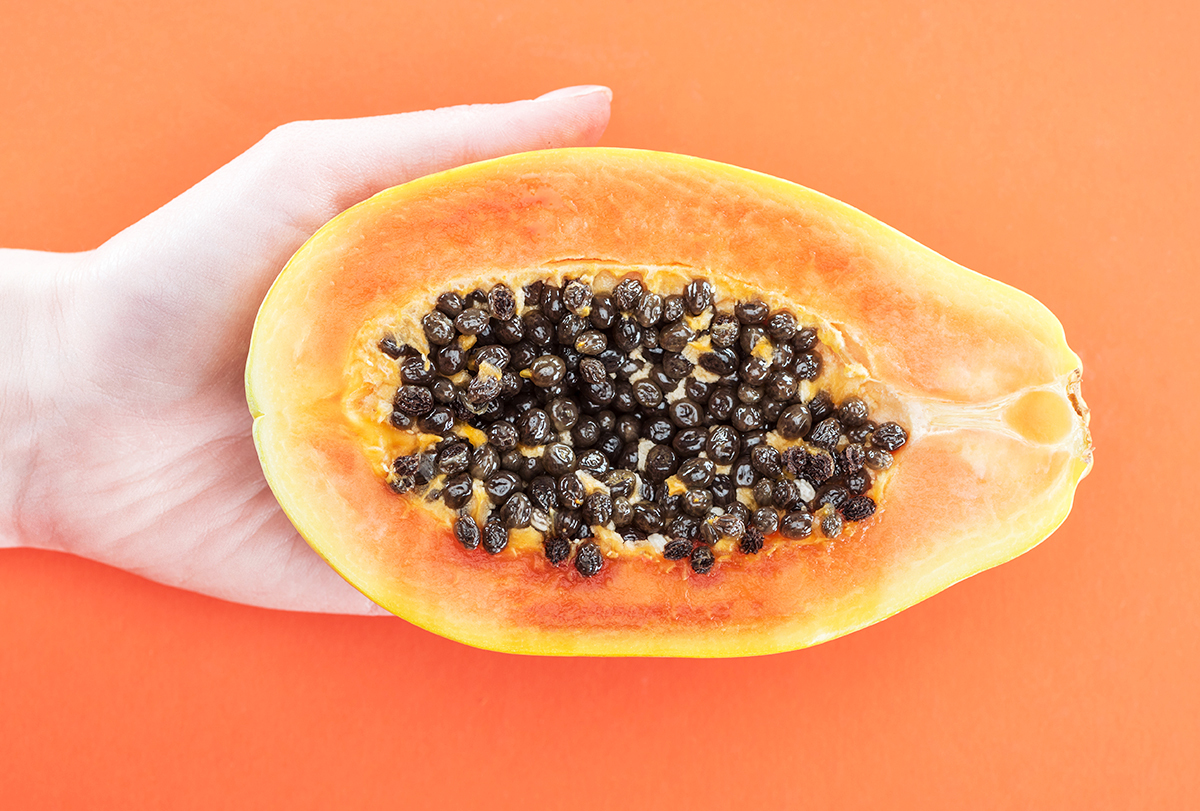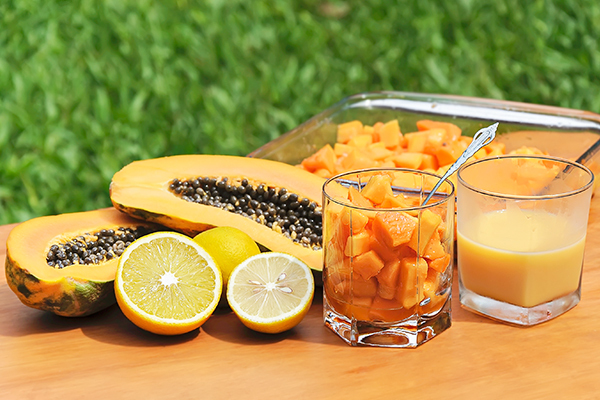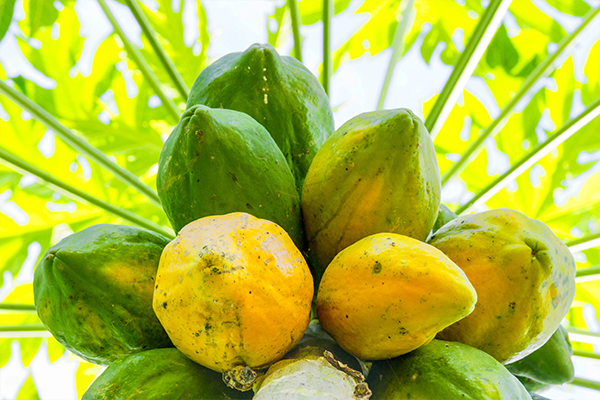In this article:
Papaya is a tropical fruit known to be very nutritious, in addition to being a sweet-tasting delight. Papaya is a good source of fiber, vitamin A, vitamin K, magnesium, potassium, pantothenic acid, and copper.

Benefits of Papaya
Like many fruits, papaya offers sweetness along with phytonutrients, water, and fiber. It is also high in compounds that act as antioxidants.
The following are some benefits of papaya.
1. Fights disorders and diseases
The lycopene and isothiocyanate found in papaya seeds may protect against chronic diseases such as heart disease and cancer. (1) Papaya also contains folate, vitamin C, beta-carotene, and vitamin E, which can help lower the risk of colon cancer.
Fruits high in potassium and other minerals are included in the blood-pressure-lowering diet called the DASH diet. DASH stands for dietary approaches to stop hypertension. Also, eating a diet rich in fruits and vegetables while limiting sodium, saturated fats, and processed foods can reduce blood pressure significantly.
The combination of nutrients, enzymes, and phytochemicals in papaya protects the body from inflammation and the inflammatory processes found in many chronic diseases such as heart disease, cancer, and arthritis. (2)(3)
2. Aids in weight management
Because papaya is naturally high in water and fiber, it can be included in a weight loss plan along with other whole fruits and vegetables. (4)
3. Promotes skin health
The antioxidants and phytochemicals found in papaya may protect all cells, including skin cells, from oxidative damage. However, this fruit often triggers an allergic response in those with a latex allergy.
In other words, people with a latex allergy are predisposed to a papaya allergy and so should exercise caution when consuming this fruit or its seeds. (3)
4. Other benefits
The vitamin C in papaya has also been shown to improve the absorption of iron. This is significant because the lack of iron is the world’s number one nutrient deficiency.
Papain: A Papaya Enzyme
Papaya is reputed for its digestive benefits, which can be attributed to an enzyme called papain. Not only does this enzyme aid digestion, but it is also an ingredient in meat tenderizers as it helps break down meat proteins.
Carpaine is another phytochemical found in papaya that may help in protecting the body from parasites and boosting the immune system. Also, the enzymes papain and chymopapain both protect the body with their antibacterial, antiviral, and antifungal properties. (2)
Ways to Enjoy Papaya

People use papaya as an ingredient in a variety of dishes, including salads, desserts, and salsas. Many people enjoy dried or candied papaya as a sweet treat that is easy to pack and have on the go.
Here are additional ways you can enjoy papaya:
- Squeezing fresh lime juice over freshly cut papaya is one of the most delicious ways to enjoy papaya. Top it with freshly shredded coconut and enjoy the tropical trio.
- Tossing in a few pieces of papaya into a green salad will sweeten things up and add some texture and color to the leafy bowl. The fruit, along with the greens, seeds, and goat cheese, could make a meal on its own.
- Throwing papaya in a smoothie along with some soft silken tofu, banana, and avocado can be a smooth way to start your day or can be an afternoon pick-me-up to boost your mood.
- Combining papaya with cottage cheese or plain Greek yogurt is a tasty snack or meal.
- Papaya is always a delicious addition to fruit salad due to its unique flavor and texture.
Things to Remember When Consuming Papaya and Its Seeds
Papaya seeds are completely edible and safe, so long as you do not have a papain allergy. There is also a concern that consuming high amounts of papain may be harmful to an unborn fetus. (5) Therefore, it is recommended to limit your intake of papaya and its seeds during pregnancy to avoid any undue effects on fetal growth.
There is inadequate evidence to determine whether papaya and its seeds are safe to consume during lactation, but it is better to keep them out of the menu while you are breastfeeding. (3)
Pregnant women are advised against consuming large amounts of green papaya or papaya seeds as they can cause potential teratogenic effects. People who are allergic to papaya and papain should steer clear of papaya and papaya seeds as they can suffer severe health consequences otherwise.
Should People With Diabetes Consume Papaya?
Those with blood sugar dysregulation can eat papaya as part of a balanced meal. Combining papaya with a protein source and some healthy fats will elicit a balanced blood sugar response.
Eating only papaya or eating too much papaya in one sitting may cause a short-term rise in blood sugar and therefore is not advisable for people with diabetes.
What Is the Best Time to Eat Papaya? Can It Be Eaten on an Empty Stomach or at Night?
There really is no right or wrong time to enjoy papaya, although some say it is better to have it as an appetizer since it contains enzymes that may aid the digestion of meats consumed during the meal.
Even though there is no harm in eating papaya on an empty stomach, you are more likely to derive its blood-sugar-controlling and appetite-enhancing benefits when it is eaten with protein, such as fish or healthy fats such as nuts.
Having papaya at night is safe. In fact, consuming papaya as an appetizer with your dinner could be beneficial as its enzymes can help your body digest the meal better.
Which Papaya Is Healthier: Ripe or Unripe?

Unripe papaya is a source of latex, which may cause an allergic reaction, skin irritation, stomach pain, and inflammation when eaten. There is some concern that the body’s response to latex can stimulate contractions and can lead to miscarriages in pregnant women.
Considering these ill effects, one should wait until the papaya has ripened properly before consuming it. To know whether papaya is ripe enough, check if it budges under pressure and starts to acquire a yellowish hue.
A fully ripe papaya is often orange in color due to the presence of beta-carotene. Excessive consumption of orange-colored produce such as carrots and papaya can transfer high amounts of beta-carotene to your bloodstream and turn your skin slightly yellow.
This condition is referred to as carotenemia, and the resultant pigmentation is most visible on the palms and bottoms of the feet. Although this may appear alarming, the yellowing of the skin is harmless and will disappear over time.
Final Word
Papaya is a great addition to your diet, not only because it tastes great and is nutrient rich but also because it helps your body digest other foods better.
Loaded with vitamins A, E, and K, along with digestive enzymes such as papain, dietary fiber, and strong antioxidants, this fruit can greatly improve various aspects of your health when eaten in moderation.
People who are struggling with diabetes can also enjoy this sweet-tasting delight in limited amounts without the fear of a blood sugar spike. Meanwhile, weight watchers can enjoy this appetizing, fiber-rich treat to curb their hunger and satisfy their sweet tooth without piling on any excess calories.
However, no single food alone can guarantee any significant improvement in your health until it is consumed as part of an overall healthy, well-balanced diet.
- Was this article helpful?
- YES, THANKS!NOT REALLY


